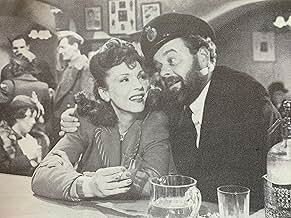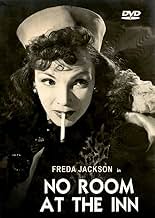Deux enfants sont évacués pendant la Seconde Guerre mondiale et confiés à la "garde" d'une femme alcoolique.Deux enfants sont évacués pendant la Seconde Guerre mondiale et confiés à la "garde" d'une femme alcoolique.Deux enfants sont évacués pendant la Seconde Guerre mondiale et confiés à la "garde" d'une femme alcoolique.
- Réalisation
- Scénario
- Casting principal
Marie Ault
- Vicar's Maid
- (non crédité)
Vera Bogetti
- Barmaid
- (non crédité)
Avis à la une
From the opening shot of a department store, with a background choir singing "Once in Royal David's City," this turns out to be an engrossing, evocative & still-powerful film, which has much merit in the message it portrays. Although it dates from 1948, and I have only seen the truncated version of 63 minutes (does anyone have the full version available?) the film is a credit to all concerned. It carries a direct and hard hitting message, and the influence of the great Dylan Thomas is clear for all to see. The casting is top notch, and Freda Jackson plays a thoroughly despicable, two-faced harridan in grand style. In its day, it must have been a forceful, and probably unpalatable, slice of life, with the exposure of dual standards particularly unsettling in certain quarters. Although a work of fiction, it comes across as very true to life and totally believable. It's a must-see film!
When I saw the film the first time I was scared out of my wits by Mrs Voray. I could empathize with evacuee children as some of them came to my town at the end of the war. The film can be viewed in full length on the Internet these days. As an adult I interpret the film as the interplay of myth and social realism. Mrs Voray has the attributes of a witch even in her looks but more significantly in her power to bewitch town worthies and others by her smarmy insinuations and false charm. I agree with another reviewer that the film recalls the world of the Grimm brothers, Hansel and Gretel particularly. Dylan Thomas was intrigued by images drawn from the world of witches and sinister occult practices. What saves the play from being a moralizing allegory is its keen almost Dickensian observation of people as they are, foibles and all.
A full-blooded post-War British melodrama set during World War 2, adapted from a stage play, co-scripted by Dylan Thomas and directed by Daniel Birt (see also THE THREE WEIRD SISTERS) and starring hatchet-faced Freda Jackson as wicked landlady Mrs Voray who takes in orphaned children and spends their allowance on drink and finery. Narrated in flashback by Mary O'Rane (Ann Stephens) as she recalls the experiences that turned both her and fellow orphan Norma Bates (get that name!), played by feisty Joan Dowling, into petty thieves, this has apparently been considerably opened out by co-scripter Thomas, to take in a less than thinly veiled attack on Church and State, as well as the kind of class hypocrisy that allowed middle-class types to tut-tut behind their net curtains at the dirty-faced urchins and carousing working-class slatterns, whilst simultaneously cooking up barely credible excuses not to take the hapless youngsters in; even when begged by a selfless and community-spirited young schoolmistress. Described at the time by 'Today's Cinema' as a '...completely sordid canvas...' and a work of '...cruelty which has no parallel on British screens...', this was clearly strong meat in its day and, even though time has dimmed much of its initial power and rendered some of its sentiment a shade sugary, its theatrics a trifle hammy and its portentous religious overtones somewhat trite and banal, this is still an undeniably downbeat tale of often almost Victorian squalor. Partially leavened by occasional shafts of wit (e.g. Voray recalls her ex-husband 'Nobody bothered about his family tree - except the dogs'), humorous comic stereotypes and sharp-tongued kids, this still packs a fair wallop; thanks in no small measure to Jackson's vividly etched turn as the kind of vicious and spiteful harridan who appears to have stepped out of a tale by the Brothers Grimm. Definitely worth a look for those interested in the often overblown, but nevertheless entertaining, school of post-War British genre cinema.
I saw this film when I was very young and it had the most amazing effect on me. My Mother took me to the cinema I think not realising that it was to be so disturbing. I now work in the caring industry and have a highly developed sense of justice, fairness and the importance of treating people as you would wish to be treated yourself which I attribute largely to this film. I will never forget it - it is the most haunting film I have ever seen. I would really love to be able to see it again from my adult perspective but cannot find it. Can anyone tell me where I might get a copy? If I had to chose one scene which affected me most it would have to be when one of the children was locked in the outside coal shed - I am now a claustrophobic and can't bear to be shut in anywhere! What a legacy to have been left by a film!!
I was Ronnie and my stage name was Stanley Conett (Stanley Heinemann) I played that part for 427 performances at the Winter Garden. Then toured England and Scotland with the show. Also I did the BBC version.It is a pity that you have published the wrong actor's name for the Winter Garden version of the show.
I was too tall to be in the film version. The Theater version often caused the audience to erupt with shouting and curses at Fred Jackson. The show ended with the girls suffocating Mrs.Voray and it was different in the movie.
Ref -corrected version in Wikipedia.
Meilleurs choix
Connectez-vous pour évaluer et suivre la liste de favoris afin de recevoir des recommandations personnalisées
Détails
- Durée
- 1h 22min(82 min)
- Couleur
- Rapport de forme
- 1.37 : 1
Contribuer à cette page
Suggérer une modification ou ajouter du contenu manquant

















